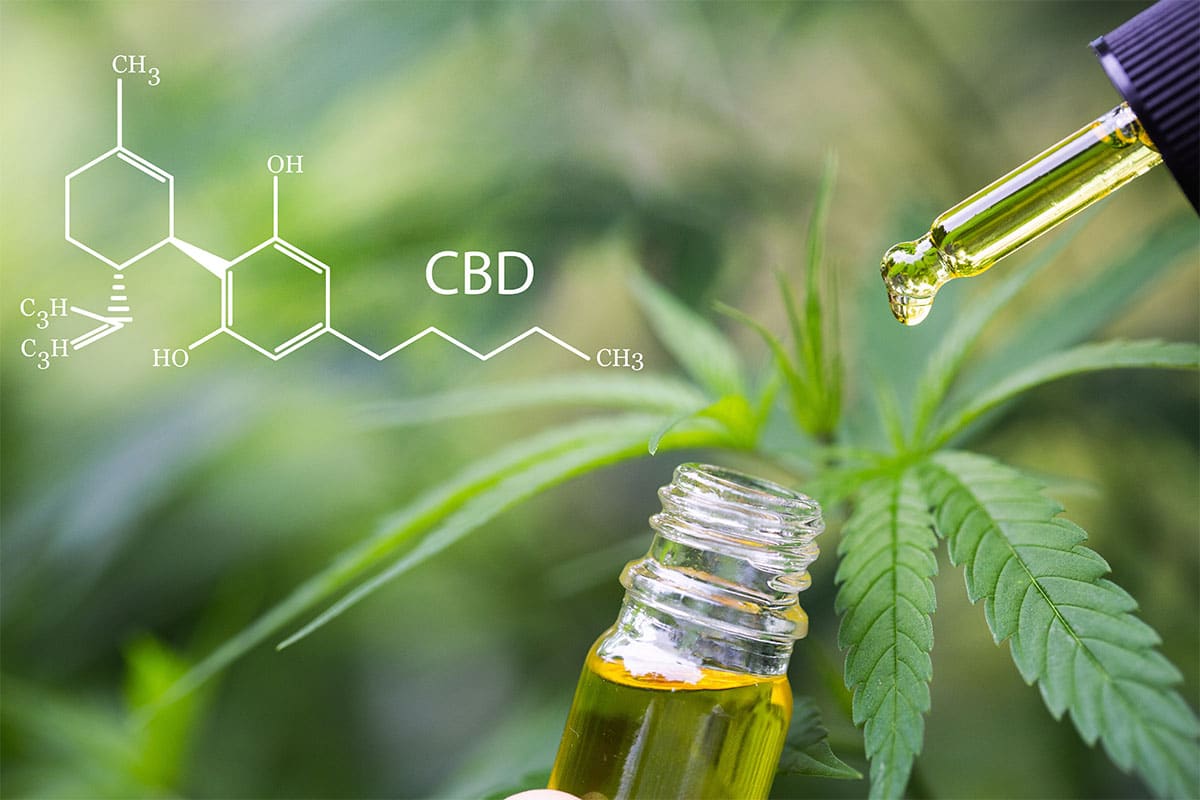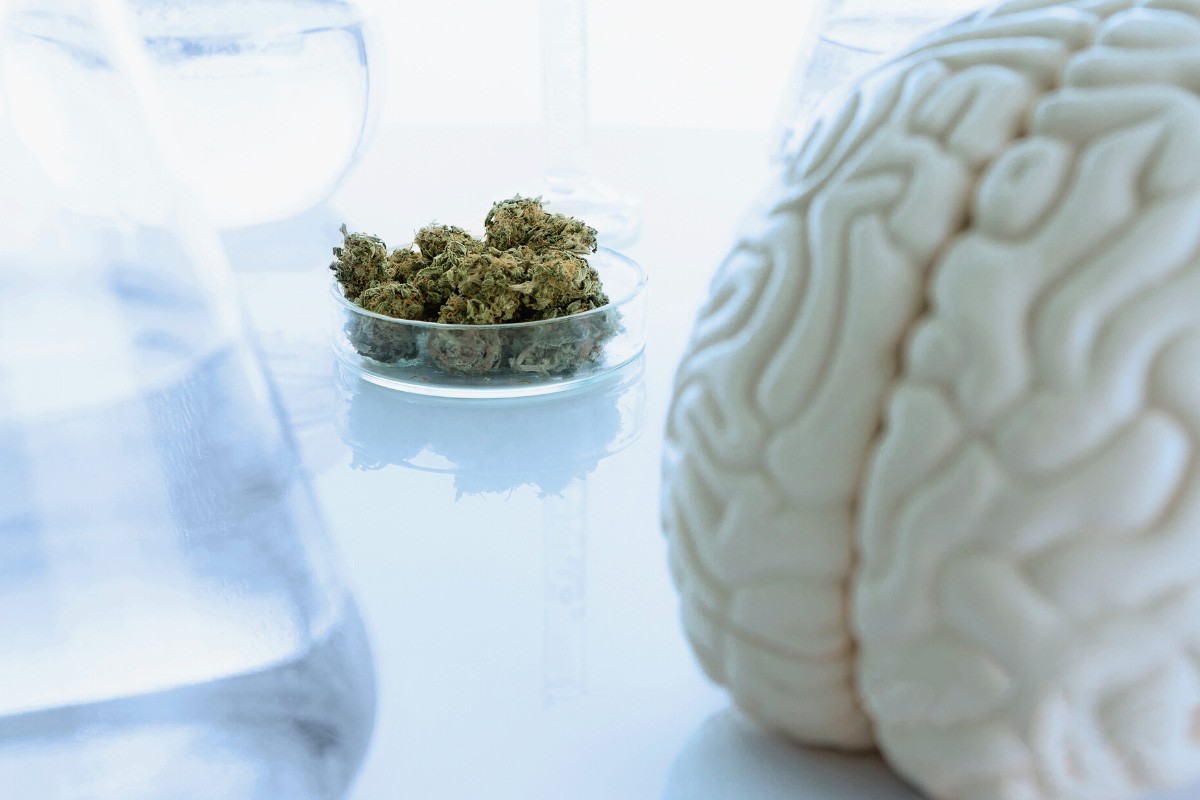Cannabidiol (CBD for short) is one of over 60 active ingredients, or phytocannabinoids (cf. endocannabinoids), contained in cannabis or is converted from the cannabidiol acid (CBDA) contained in the cannabis plant. Unlike other cannabinoids (such as THC), however, CBD is not psychoactive, meaning it does not produce a euphoric feeling, so it does not have an intoxicating effect. Instead, CBD oil and other CBD recipes are said to have many different positive effects on health and well-being, including relieving pain and inflammation, improving sleep, and reducing epileptic seizures, anxiety, and depression. According to findings on the use of CBD in depression, it could own as a fast-acting antidepressant [1].
The correct dosage of CBD and dosage form of cannabidiol (CBD) is crucial for the effectiveness of the cannabinoid. How CBD is administered and how quickly and long after administration (e.g., oil, drops, capsule, gel, flower) CBD might work was outlined in a comparison in the linked post on the effects of CBD. Rather in this in-depth post here, we will specifically highlight the properties, effects and recommended dosages of CBD oil (up to, say, 10% concentrations) in drops and milliliters.
The use of CBD and basic dosage
The dosage of CBD is offered in various dosage forms, for example, as CBD oil, extract, tea, capsules or cosmetics. The most popular is CBD oil, because CBD oil it is easy to use and can be taken virtually anywhere. Concentrations from 5% to 10% can be suitable for first time users: With a few drops, you simply reach the desired amount of CBD oil when needed, keep it under your tongue in your mouth for about 20-30 seconds before swallowing it down. In this way, the active ingredients of CBD oil can quickly enter the body through the oral mucosa and can develop their effects. Alternatively, you can also drip the oil onto a piece of sugar or a piece of bread.
In addition to the ease of use and the possible effects for anxiety and depression, CBD oil has another advantage: It is available in different concentrations and is also easy to dose, so that users can take exactly the required amount of CBD to achieve the possible effect. But with high-dose CBD recipes that require a prescription, a medically supervised CBD therapy should be considered. In a screening process, it is determined for which diseases and in which dosage CBD could be used and how it could support health.
But how can the optimal dosage of CBD be established at all and how would also a doctor proceed with the CBD dosage? With a few drops, we said, but how many could be enough?
The optimal dosage of CBD in drops
First of all, what the optimal dose of cannabidiol oil could be, is impossible to say across the board, because it depends on a number of factors for health that can’t be predicted via this article. A cannabis doctor could be able to determine a precise dosage of CBD and its effects for your individual case more quickly than you would be able to determine it for yourself without specialist knowledge, as these CBD experts check all the necessary factors. Among other things, the dosage depends on the reason for ingestion: For example, should the CBD oil have calming effects, possibly support with the treatment of anxiety or relieve pain? On the other hand, people react very differently to active ingredients and dosages. While one patient may notice a change even at a low dose, another patient may not notice any effect even at higher doses.
Scientific studies use daily doses of 20 mg and 1,500 mg of CBD and confirm: There is no universally correct dosage of CBD that is optimal for all uses and users [2]. Rather, it depends on individual factors, such as body weight, overall health and body chemistry, the area of application, and the concentration of CBD oil. For beginners, a lower concentration such as 5% or 10% CBD oil could be compatible. Intakes with a high dosage of CBD are not recommended without a doctor’s instruction and examination of individual factors for CBD therapy, such as it could be suitable for the support of treatment of anxiety. Also, with low concentrations up to 10% CBD, care should be taken not to exceed the recommended maximum amounts (in drops or milliliters) per day, otherwise a high dosage may also be achieved.
The concentration of CBD oil
The CBD concentration is usually written on the bottle or packaging of the CBD oil. Ideally, it indicates how much cannabidiol is contained in a single drop. This could make the dosage easier. Sometimes, however, the packaging only states the total amount of CBD contained in the entire bottle. Then you would have to do a little math to get the desired dosage of CBD. The following information may be helpful for users, but also for doctors or physicians who deal with the administration of CBD:
A single drop of CBD oil could be equivalent to about 0.05 ml. This means that a 10 ml bottle of CBD oil would contain a total of (10 ml : 0.05 ml =) 200 drops. If a total amount of 1,000 mg of CBD is indicated on the CBD oil packaging, this approximately corresponds to a concentration of 10% CBD and an amount of about 5 mg of CBD per drop. For a desired CBD dosage of, say, 20 mg of CBD, you would have to take 4 drops of CBD oil in this case. Whether you take these drops in a single daily dose or spread them out over three intakes daily also depends on the objective. If the CBD is to help you fall asleep, only taking it in the evening would be recommended. However, if the goal is to relieve chronic pain, the effect should ideally last throughout the day and the CBD oil should be taken at a different frequency.
Tips for the correct CBD oil dosage
Generally, start with a low dose of CBD and gradually increase it as needed. However, do not be too impatient, it may take a few days before a noticeable effect of CBD could occur after regular intake. Therefore, it is better to wait a little longer before increasing the dosage of your CBD oil. If you are using concentrations of 10% CBD or higher, you should always talk to your doctor before adjusting the CBD oil dosage yourself.
For example, you may want to use CBD to relieve chronic pain. Start with a dose of 20-40 mg of CBD per day, the equivalent of 4-8 drops. After a week, increase the CBD dose with your oil by 5 mg, the approximate equivalent of one drop of CBD oil. If this does not lead to the desired effects, increase the dose again by 5 mg CBD after one week. Continue in this way until you notice a noticeable improvement in your symptoms. Keep in mind, however, that not everyone is equally sensitive and CBD oil and the CBD dosage exemplified here do not work for everyone (in the same way). Our recommendations in this article on CBD oil dosage are therefore not to be equated with a medical consultation and can not replace it. If you want to proceed according to medically individualized instructions so that your ailments could be treated with the right CBD dosage, consider supervised CBD therapy.
Advanced CBD oil dosage tip
Record the amount of CBD you take and the intensity of your symptoms beforehand, and if you and when you notice a change, so you can track it later and adjust dosages accordingly. If you are undergoing medical treatment with CBD, this documentation could also help your doctor to understand the correct dosage and your individual symptomatic profile for your CBD therapy. How long the effect lasts can also be an important information, for example, to find out the ideal time of day to take it.
Are overdoses with CBD oil possible?
CBD is considered to be well tolerated. Studies have shown that even sustained use of high doses of CBD (up to 1,500 mg per day) and it effects could be well tolerated by humans [2, 3]. However, there are indications from animal studies that there may be interactions with other medications [4], which you should consider when taking CBD oil. Since there are still too few findings from human studies, you should – if you regularly take medication and are now considering an application / dosage of CBD oil – first consult your doctor.
So far, very few side effects of CBD are known. For example, in rare cases, increased fatigue, changes in appetite, diarrhea or weight changes may occur after taking CBD formulations.







